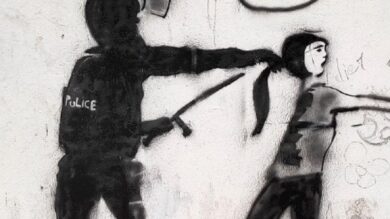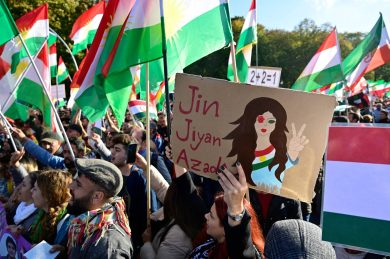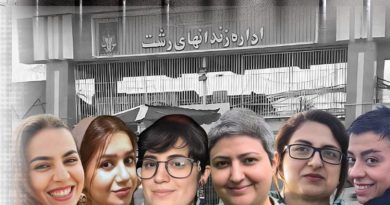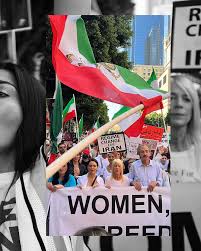As Iranian activists face brutal repression from the Islamic Revolutionary Guard Corps (IRGC) and other regime forces, global solidarity has become a powerful tool to support their fight for human rights, democracy, and equality. International protests, media coverage, sanctions, and human rights advocacy are crucial in amplifying the voices of Iranian dissidents and putting pressure on Iran’s leadership to respect fundamental freedoms. This article explores how global solidarity efforts—through diplomacy, public activism, and media—can support Iranian human rights defenders, challenge the IRGC’s repression, and promote justice and accountability.
1. The State of Human Rights in Iran
A. Systemic Repression by the IRGC
The IRGC, alongside Iran’s judiciary and security forces, is responsible for severe human rights violations, including:
• Arbitrary arrests and torture of activists, journalists, and political dissidents.
• The suppression of women’s rights through compulsory hijab laws and restrictions on personal freedoms.
• Violent crackdowns on protests, such as the 2019 fuel price protests and the 2022 Mahsa Amini protests, which resulted in mass killings and arrests.
B. The Impact on Activists and Civil Society
Activists in Iran face harassment, imprisonment, and forced confessions. Human rights organizations have documented cases of torture, sexual violence, and executions, underscoring the urgent need for international support.
2. The Power of Global Solidarity
A. Amplifying Voices Through Media and Protests
International protests and social media campaigns have brought global attention to Iran’s human rights crisis. Diaspora communities and human rights organizations play a critical role by:
• Organizing rallies and demonstrations in major cities worldwide, such as London, Berlin, and New York.
• Using hashtags like #WomenLifeFreedom and #MahsaAmini to raise awareness about human rights abuses in Iran.
Example:
Following Mahsa Amini’s death, protests erupted globally, putting pressure on UN officials and foreign governments to take action.
B. Diplomatic Pressure and Sanctions
Governments have responded by imposing sanctions on key IRGC officials and institutions involved in repression. These measures aim to:
• Restrict the IRGC’s financial networks.
• Hold perpetrators accountable for crimes against humanity.
• Encourage Iran to engage in dialogue on human rights reforms.
C. Support from International Human Rights Organizations
Organizations like Amnesty International, Human Rights Watch, and Reporters Without Borders have been instrumental in:
• Documenting and exposing human rights abuses.
• Lobbying for UN investigations into extrajudicial killings and torture.
• Providing legal and financial aid to at-risk activists and journalists.
3. Case Studies: Successful Solidarity Efforts
A. The Global Response to the 2009 Green Movement
• After allegations of election fraud, millions of Iranians protested, demanding democratic reforms.
• International solidarity helped expose IRGC violence, leading to sanctions on Iranian officials and increased support for civil society organizations.
B. The Women, Life, Freedom Movement
• The 2022 protests led by women called for gender equality and an end to state violence.
• The movement gained global momentum, with women’s rights advocates, celebrities, and politicians voicing support.
• Countries like Canada and Germany imposed sanctions on morality police and IRGC commanders.
4. Challenges to Global Solidarity
A. Diplomatic Obstacles
Some governments prioritize economic or diplomatic ties with Iran over human rights issues. Ongoing nuclear negotiations often limit the willingness of countries to impose stronger sanctions.
B. Disinformation and Propaganda
The IRGC spreads disinformation to counter international criticism, portraying activists as foreign agents and protests as Western conspiracies.
C. Internet Censorship
During protests, the Iranian regime enforces internet shutdowns, making it difficult for activists to communicate and share information globally. This limits real-time updates on human rights abuses.
5. Strengthening Global Solidarity
A. Enhancing International Advocacy
To strengthen support for Iranian activists, governments and organizations should:
1. Prioritize Human Rights
• Make human rights a central issue in diplomatic negotiations with Iran.
2. Increase Sanctions Enforcement
• Target IRGC assets, front companies, and cyber units involved in surveillance and repression.
3. Support UN Investigations
• Push for independent inquiries into crimes against humanity committed by the IRGC and other regime forces.
B. Expanding Digital Support
Providing digital tools and cybersecurity training can help activists bypass censorship and protect their communications.
• Organizations can supply VPNs, encrypted messaging apps, and secure communication platforms.
• Tech companies must ensure that internet access remains available during political crises.
C. Supporting Civil Society and Independent Media
• Funding for Persian-language media outlets, such as BBC Persian and Iran International, is essential to counter IRGC propaganda.
• Human rights defenders and NGOs need financial and legal resources to continue their work safely.
6. The Role of the Iranian Diaspora
The Iranian diaspora plays a critical role in amplifying the voices of activists and victims. Their efforts include:
• Organizing protests and advocacy campaigns.
• Raising funds for humanitarian aid and legal support.
• Collaborating with international organizations to document human rights abuses.
7. Long-Term Strategies for Supporting Human Rights
To sustain global solidarity with Iranian activists, the international community must adopt long-term strategies:
A. Institutionalize Human Rights Mechanisms
• Establish independent monitoring bodies to track human rights violations in Iran.
• Strengthen global coalitions focused on women’s rights, freedom of expression, and minority protections.
B. Promote Education and Awareness
• Public campaigns can educate global audiences about Iran’s human rights crisis and the need for continuous advocacy.
• Encourage schools, universities, and cultural institutions to highlight stories of Iranian activists.
C. Increase Humanitarian Support
• Expand asylum programs for at-risk activists and their families.
• Provide mental health resources for survivors of trauma and imprisonment.
Conclusion
Global solidarity is essential in the fight for human rights and freedom in Iran. By amplifying the voices of activists, imposing sanctions on perpetrators, and supporting independent media, the international community can weaken the IRGC’s control and empower civil society. The ongoing struggle for justice in Iran requires collective action, sustained advocacy, and unwavering support for those risking their lives for a better future.
Join Our Newsletter!
Stay informed with the latest updates, news, and ways to take action in the fight for justice and global security. Sign up now to get updates delivered straight to your inbox!





